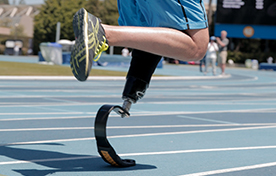The Psychological Aspects of Amputation
If you have had an amputation or are going to have one, let me assure you that others have already gone through the same experience. You may be feeling physical pain, fear, apprehension, loneliness, uncertainty and sadness, but I can assure you that you will make it through all of this. You are probably dealing with amputation because you and your doctor deemed it necessary to save your life or because it was the result of circumstances beyond your control. Either way, you had no choice.
Regardless of the cause of your amputation, you will probably go through basically the same psychological stages. It is essential that you go through the grieving process, and some people will do it in a short time, while others will take several months. It is important, however, that you acknowledge and understand the process as you are going through each stage. With the loss of a limb, the two most common types of grief are anticipatory grief and normal uncomplicated grief. Anticipatory grief occurs before a loss and is associated with a diagnosis of a life-threatening illness, and a forthcoming amputation. Here, we will only deal with normal uncomplicated grief, and it is important to understand that this is a normal process.
The Five Stages of the Grieving Process
Denial
Denial is usually experienced by people who go through traumatic amputations, and normally those who have had surgical amputations will not experience it.
Anger
Often people will blame God, the doctor, or others for their loss. The Psychological Aspects of Amputationby Saul Morris, PhD
Bargaining
In this stage, patients may attempt to postpone the reality of amputation, and most patients will try to bargain with their doctor or through a higher authority such as a religious figure.
Depression
In this stage, anger is replaced by depression. This is probably the most complicated stage of grief, but it too will go away. This is not clinical depression. It is normal. Common symptoms include sleeping either too much or too little, negative feelings about the environment and the future, feelings of hopelessness, and talking about death. Depression is not a sign of weakness, however, and should not be seen as such. It is treatable, and you should not hesitate to seek help from your doctor, nurse, family and friends.
Acceptance and Hope
Eventually, you will come to terms with your loss and start living again. This is more easily achieved if you have a visit from a peer counselor who has been through this entire process and can give you some tips on coping with your loss.
Complicated Grief
Although complicated grief is not common in amputee patients, you should be aware of its symptoms, which include severe isolation, violent behavior, suicidal ideation, workaholic behavior, severe or prolonged depression, nightmares, and avoiding reminders of your amputation. If you do experience any of these symptoms, please inform the appropriate medical professionals.
Compounding Factors
Along with the loss of your limb, you may also experience other complications, depending on your situation and your support from others.
During this period, you will probably find that stress is at its highest level. There are, however, many ways of coping with this problem. If you speak to your medical professional, perhaps he or she can help you. You may also experience loss of self-esteem, loss of self-confidence, fear of rejection from your mate, questions about your body image, and financial problems. Probably one of the most difficult problems is losing your sense of independence and having to rely on others for some of your most common everyday needs.
This is not to scare you but to warn you that these feelings may occur. A lot of them may, however, be based on false assumptions. The loss of self-confidence and self-esteem, for example, is not necessary. Your self-confidence and self-worth are in your mind, not in the leg or arm you have lost. You are still the same valuable person you were before this loss. You will find that as time goes by, you will learn to adapt, and your whole attitude will change for the good.
Another mistake we as new amputees make is in our perception of our body. After an amputation, it is quite normal to feel that you may no longer be attractive to your partner. Perhaps this might be true in some cases, but if your partner really loves you, the loss of a limb will make no difference in your relationship, sexual or otherwise. Of course, some adjustments may be necessary, but they can and will be made, and eventually things will get back to normal.
Yes, we are a little different, but so is everyone else. After my amputation, I sat at home ashamed to go out because I too was concerned about my body. We have a swimming pool, and I was ashamed to even use it. Boy, was I foolish! Don’t fall into this same trap. This false shame is in your mind. We are overly concerned because we fear what others will think about our appearance. I felt the same way until one night I was watching America’s Funniest Home Videos and saw the strangest thing I have ever seen. It was a dog running at top speed with two amputations, both on the same side! I thought it was strange, but do you think the dog did? Of course not. The dog was able to cope with his loss, and he was out in the back yard playing. He didn’t care that he was different. All he cared about was enjoying life. We can learn a lot from a dog.
If you have these false impressions of yourself, try to work them out. There are many sources of help available, and you should not be afraid to talk about these problems with someone. Most amputees have felt some of these things, but they have gotten through them, and so will you.
I am a strong advocate of amputee peer counseling, and if you are fortunate enough to be visited by a trained peer counselor, he or she will take the time to sit with you alone and inquire about your concerns. He or she will also take the time to speak with your family and your partner as well. As you are going through the grieving process, be aware that your entire family is also going through it. It is important to get these feelings out in the open and communicate them honestly. Otherwise, they will just fester and cause more harm to you, your family and your partner.
We all have the right to be the person we want to be, and the only person who can take that right away from us is our self. As someone who has counseled many amputees, I know that all of your difficulties will pass. It is up to you to think about you and your life in a positive way to ensure that you have a productive future. It is easy to fall into the pit of self-pity, decide that you are worthless, and end up spending some or all of the rest of your valuable life hibernating. Don’t let this happen. If you need help coping, there are many resources that can be useful to you. If you have a peer counselor, talk it over with him or her. After all, he or she made it through the same thing that you are going through. You can too.
About the Author
Saul Morris, PhD, is a below-knee amputee. He is educated in both psychology and medicine. He is a veteran naval commander and has served in both the Vietnam and Gulf wars. He is the founder and director of M-STAR (Michigan Society to Advance Rehabilitation), an organization that provides amputee peer counseling to new amputees. He spends an enormous amount of time educating the medical profession about the value of amputee peer counseling and the psychology of amputation.Additional ResourcesCoping with Limb Loss, by Ellen Winchell. Order by calling toll-free 1-888/267-5669, ext. 8135, or on the Amputee Coalition Web site: www.amputee-coalition.org
Additional Resources
Coping with Limb Loss, by Ellen Winchell. Order by calling toll-free 1-888/267-5669, ext. 8135, or on the Amputee Coalition Web site: www.amputee-coalition.org
Disclaimer: The following information is provided and owned by the Amputation Coalition of America and was previously published on the website http://www.amputee-coalition.org or the Coalitions Newsletter, inMotion.








